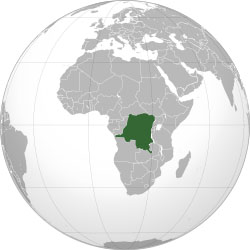
02/27/2013
Students who wonder why they should learn about the ongoing violence in the Congo need to look no further than their cell phones.
Coltan, a mineral critical to the manufacture of cell phones, laptop computers and other electronic devices, is the natural resource fueling bloody conflicts between army factions and rebel groups responsible for the death of more than 6 million people over the last two decades.
That’s why SUNY Cortland is hosting a teach-in on the situation in Congo, a central African country roughly the size of Western Europe, at 4:30 p.m. on Monday, March 4, in Sperry Center, Room 105.
The teach-in will feature human rights activist Kambale Musavuli, national spokesperson for Friends of the Congo, a non-profit group that works to improve the lives of people in the Democratic Republic of the Congo and bring about peaceful change.
“The Congo, a country miles away in the heart of Africa, has known tremendous suffering since its modern creation in 1885,” Musavuli said. “With support and solidarity from American people such as Mark Twain and Booker T. Washington, people in the USA were informed about the atrocities in Congo over 100 years ago and raised their voices to stop the deaths of millions of Congolese.
“One hundred years later, we have again lost millions of Congolese in a resource war in the attempt to control Congo’s wealth, made up of minerals essential to modern-day technology.”
The multiple battles over Congo’s resources frequently involve the use of kidnapped, child soldiers and mass rape as tools of warfare. The violence destabilizes the struggling government, creates disease and poverty and prevents the country’s 71 million people from realizing their full potential.
The teach-in is not only aimed at raising students’ awareness about the true cost of the electronic devices that connect them to the Internet and each other, but to show them what they can do to help change the situation, said Lorraine Berry, project director of NeoVox, one of the sponsors of the event.
The teach-in also is supported by the SUNY Cortland President’s Office; the Geography, Philosophy, Africana Studies and Political Science departments; the TransAfrica Project; the Center for Ethics, Peace and Social Justice; the Center for Gender and Intercultural Studies; Women’s History Month; the Cultural and Intellectual Climate Committee; and the Campus Artist and Lecture Series.
For more information, contact Berry.